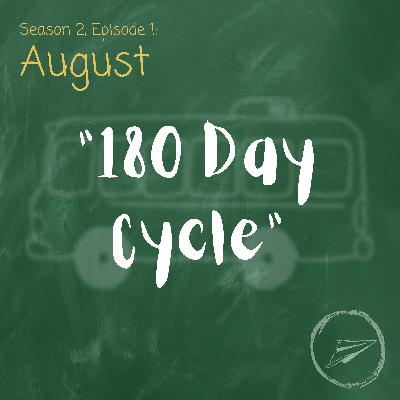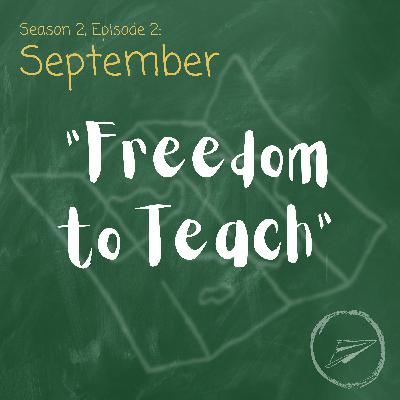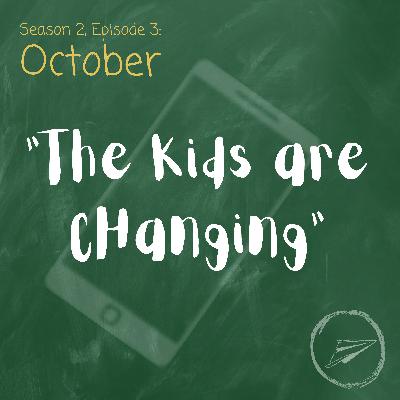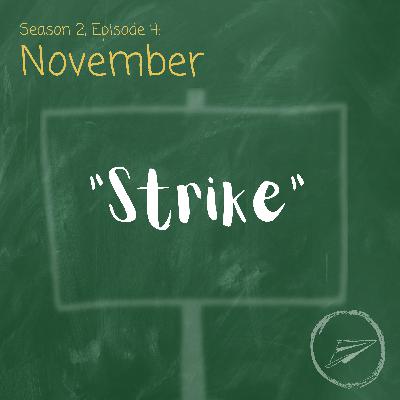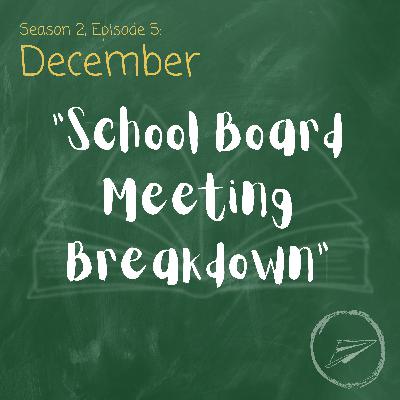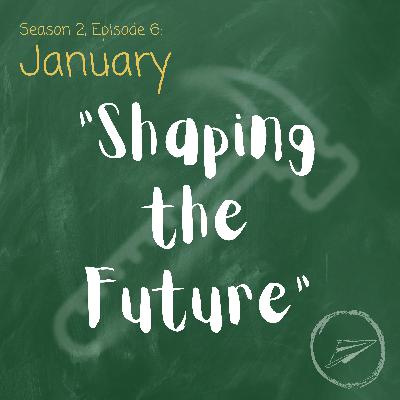7: Those Who Can't Teach Anymore
Description
Think about your favorite teacher. What were they like? What made them your favorite? Now, imagine if your favorite teacher quit their job before you had them in your life. What would you have lost? Think about what future generations of students will lose if more teachers leave because teachers don’t feel valued or trusted or fairly compensated. If things don’t change, more teachers will leave because they are realizing that they can. In this episode, we hear from former teachers who left education and are happier for it.
Music:
Theme Song By Julian Saporiti
“Don’t You Leave” by Crowander is licensed under a CC BY-NC license.
“Happening for Lulu” by Kraus is licensed under a CC BY-NC-SA license.
“Soldier’s Story” by Blanket Music is licensed under a CC BY-NC license.
“Be Nice” by Jahzzar is licensed under a CC BY-SA license.
“Fireworks” by Jahzzar is licensed under a CC BY-SA license.
“Faster, Sons of Vengeance, Faster!” by Doctor Turtle is licensed under a CC BY-NC license.
“Changing Moment (ID 1651)” by Lobo Loco is licensed under a CC BY-NC-SA license.
Transcript:
A quick warning, this episode discusses sexual abuse.
During the quarantine, I received an anonymous letter from a former student that had since graduated. After pleasantries, the note says “I’m writing you now to thank you for things that you never knew you did when I was your student.”
And then they go on to explain that though I would not have known this, they had been sexually abused by their father, and they had just found the strength to tell someone, cut ties, and start the healing process. They said that my class was a space that made them feel safe, heard, and respected. They wrote that I helped them quote “understand that there are good men, ones that deserve to be fathers.” end quote
They were intentional in saying that they didn’t know if I would figure out who they were, but regardless, they wanted to thank me and let me know that I played a part in helping them get through the abuse.
Every time I read this letter, it breaks me. I hate that this student had to go through this. I hate their father. I am humbled by the fact that I could be a source of support for this student, and I hope so badly that they can heal.
No kid should ever have to experience this, but they do, and because they do, they need adults, teachers, in their lives that can support them, even if those adults are unaware of that support. We need teachers who are themselves supported and happy and in a space that values them, so that they can be as wholly present as possible for students.
But at this moment in time, many teachers, so of the people that students need most, don’t want to teach anymore. And that fact is devastating.
We’re at the end of this series. We’ve explored a variety of things contributing to teachers leaving the profession - feelings of being devalued, a lack of autonomy, struggles with mental health. We’ve looked at why teachers might be treated the way they have been, from pop-cultural stereotypes to an odd historical inheritance …to having unclear expectations of what education is for. And we’ve even looked at some solutions and where they come from. All of this to make sense of why teachers might be leaving, and to draw attention to the fact that without authentic and relevant change that is not the burden of teachers, teachers will keep leaving.
Today, we will hear teachers who left education explain how their lives are now, and we will explore some resources available to teachers who are looking to leave education. And from what I’ve heard through interviews and people reaching out to me because of this podcast, a vast majority of teachers that have left the classroom are much happier. So, if nothing from this season has convinced you that we need to do something to keep teachers in education and something real, maybe this episode will. I am not saying this as a threat, but from the perspective of a realist. Think of it as a natural consequence. Refuse to address and take genuine action to keep teachers, or they will find their way out of education because they can. And in this present moment, they will likely be happier for it.
This is the finale to Those Who Can’t Teach Anymore, a 7-part podcast series exploring why teachers are leaving education and what can be done to stop the exodus. I’m Charles Fournier.
Here is part 7: “Those Who Can’t Teach Anymore”
Camile Lofters reached out to me in the early stages of this project. Camile was a high school English and journalism teacher in south Florida. She left teaching after 15 years in the classroom , and she was one of those people that felt destined to be in the classroom.
Camile Lofters: I feel like teaching was in my blood. My mom was an early childhood education major and taught preschool, and, you know, lower elementary school. So I mean, I grew up watching her, and wanting to emulate her. So I would line up my stuffed animals and like, I had a little pointer, and I would teach them things. And when I graduated, I was so excited to start teaching that it was like everything to me.
But like most of the people that shared their stories throughout this podcast, Camile left. And even though she is from Florida and most of the other folks I’ve spoken with are from Wyoming and the west, Camile’s reasons for leaving were the same. She pointed to not being trusted or seen as an expert, to politicians that oversteps their role in education, to low pay, to being undervalued, and the list goes on. And like the other teachers, Camile still values education.
Camile Lofters: Even though I did leave the profession, I still love teaching, and I still think it's one of the greatest professions. But as we all know, in our country, education system is a little broken, maybe it's a lot broken is a better way to say it. So, I feel like when the pandemic happened, it sort of broke everything wide open forever for a lot of people. I mean, it's not like it's just me.
We haven’t addressed the pandemic much throughout this series. Not because the pandemic didn’t have a significant impact on teachers deciding to leave, but because the reasons teachers are leaving didn’t start with the pandemic.The pandemic forced teachers to reflect on what they’re willing or not willing to accept. Camile reflected on whether she could teach for another two decades.
Camile Lofters: And the answer used to be yes, I'm going to teach until I’m 60. And when it started to become like I don’t know, and then it was like, definitely not. And I was like, this means I need to do something else. You know, if I'm feeling that way, it's not fair to myself, my family, but also I think to the students. They deserve to have teachers that are really excited to be there. And yes, I am a good teacher and I could go back and still I think do a good job, but I just feel like mentally I would be falling apart and that's not that's not really fair to anybody.
You’ve heard this throughout the series. Many teachers are leaving because they know that they aren’t doing their job as well as they want to, so they leave. The pandemic contributed to this. More teachers thought about what they could and couldn’t do anymore. The pandemic made the job more difficult. Skepticism of teachers rose, student and parent behaviors became worse, everyone’s mental health seemed to get worse, and more expectations were placed on teachers. Teachers know this, but when more is put on a teacher’s plate, it’s usually not taken off.
Camile felt this, and she also had a daughter in the middle of it all.
Camile Lofters: That 2020-2021 school year was just really, really difficult. And so then by the time my daughter was born, you know, in June 2021, I was like, No, this is this, I gotta find something else.
So she started the process of looking for something that she could transition into. And she was looking for something that would allow for more financial opportunities. On top of having a daughter, feeling all of the frustrations and stressors of teaching and the impact of the pandemic, Camile wanted to be paid better.
Camile Lofters: Pay was a big part of it. It's really disheartening to work so hard for so long and never see an increase in your salary. I graduated from college with all my friends, we were all making about the same amount of money. And now most of them are making double, if not triple you. You know what I'm making. I worked really hard to be a good teacher and constantly doing professional development and looking for new strategies. And so I think it's disheartening to not have that com





